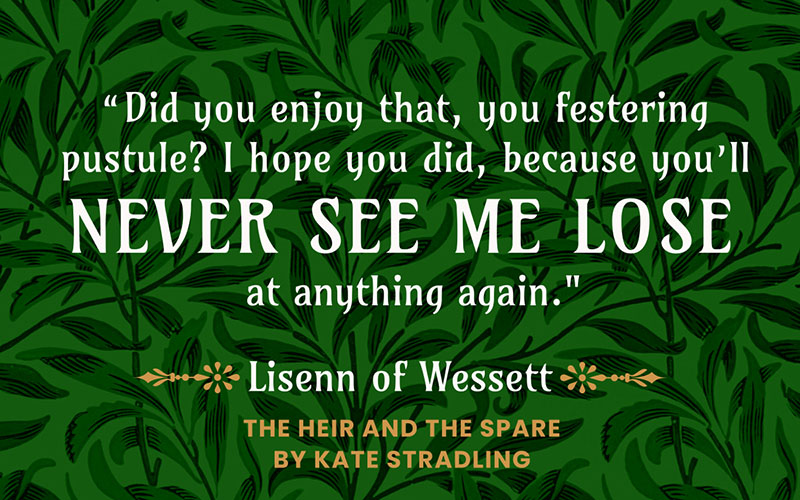This third of four posts about THE HEIR AND THE SPARE examines the antagonist of the novel, Lisenn of Wessett.
SPOILER ALERT, especially for this post. All the end-game spoilers lie below.
Crown Princess Lisenn of Wessett

This demented woman never stood a chance. The narrative doesn’t reflect this, but I kind of pity Lisenn. To King Gawen, the security of the kingdom depends on having no conflicting claims for the throne. Thus, he twisted Lisenn into the psychopath we know and despise. Rather than risk two daughters with tender enough feelings for one another that the elder spares the younger, he pitted Lisenn against Iona from the start.
In short, “This is your replacement should the occasion arise. Don’t disappoint me.”
Because he’s such a bloodless, uncaring parent, she believed him. Her younger sister’s very existence posed a material threat to her future and her peace of mind.
Gawen repeatedly goads Lisenn. She knows her grandfather schemed and killed his older brother for the throne because her father told her. In fact, most of the on-page interactions between the king and his heir, especially the voiceless ones, are him needling her on how easily Iona could usurp her place.
So, Lisenn is a victim of mental and emotional abuse, but she’s also an abuser. Because of how deeply she embraced that role, a redemption arc was out of the question.
Vicious without remorse
In crafting her character, I couldn’t pull my punches. Iona repeatedly lies to herself that her situation is not that bad, that she can control her encounters with Lisenn through tactics of camouflage and avoidance, and that her sister, while malicious, still has some self-restraint. Because I bound the POV so closely to her thoughts and emotional reactions, I needed the reader to understand that Lisenn was truly, definitively evil and that Iona, in survival mode, was deluding herself.
However, I have since learned that certain things don’t bother me to the degree that they bother others. Tooth-pulling, for example. My dad was a dentist. My first job was in his office. I grew up around pictures of teeth in various conditions and saw my fair share of them fresh from patients’ mouths. I’m desensitized to pulled teeth.
(Broken teeth are a different story. Exposed dentin and nerves, risk of infection, little play to extract the rest of the root, and the throbbing pain that all of that causes… yikes. Broken teeth are the worst.)
Anyway, child-Iona getting some baby teeth pulled seemed like the correct level of maliciousness for how vain Lisenn was even from a young age. That it happened twice was a cue that one or both parents were, if not complicit, complacent. But, I think this detail bothered a lot of readers.
Sorry. They were baby teeth, though. Timing-wise, some of them were about to fall out, others had roots already dissolving, and the permanent ones grew in just fine.
It doesn’t make Lisenn any less awful, but Iona was able to weather that episode fairly well. (Hence her persistent self-delusion.)
A generational curse
As I was drafting, I wondered whether a secret multi-generational pattern of murder was beyond belief, especially in such a high-profile family. But, if I go back twenty-five years in US politics, I can’t tell you jack about Bill Clinton’s siblings (except the vague knowledge that he has at least one). I know absolutely nothing about his parents. For monarchies, I know zilch about Queen Elizabeth’s brothers and/or sisters or parents. I can only list two of her children off the top of my head. This, in an information age where a cult of celebrity follows high-profile people and Wikipedia supplies every name, date, and major event at the click of a button.
So, I reasoned that, in a fantasy setting where news travels at the speed of a horse, one death per generation with a plausible, tragic explanation could vanish from the social memory before the next one occurred. The family, if pressed, would lament their ill fortunes, and because the country remained stable and prosperous, there was no reason for the average citizen to speculate sinister motives.
Not so with Lisenn. Because Gawen groomed her to be ruthless, stories spread beyond the castle. The inklings of suspicion that surrounded her Uncle Orran’s death solidified. Thus, the tragedy of one generation connected to the next in a dangerous pattern.